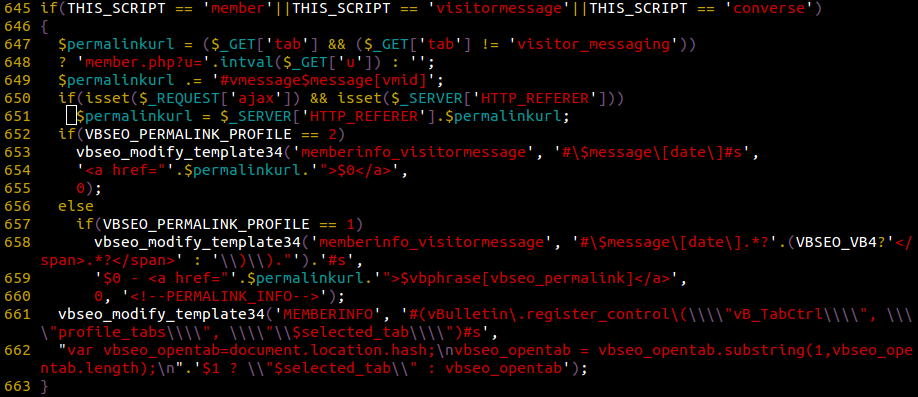vBSEO’s Vulnerability Leads to Remote Code Execution
We were notified last week that the vBulletin team sent an email to all their clients about a potential security vulnerability in vBSEO. After further investigation, we confirm that this is a very critical issue as it could allow an attacker to execute malicious PHP code on your website, manually patching this add-on should be done immediately.
Is everyone using this add-on at risk?
It really depends, as vBulletin is a highly configurable piece of software, you may or may not be directly affected.
The vulnerable snippet of code executes upon loading vBulletin’s memberinfo_visitormessage template. That means that if you allow your visitors (authenticated or not) to leave and see the “visitor messages” section of a user’s profile, you’re at risk.
Technical details
For some reasons, vBSEO will insert user-provided referer link into the visitormessage template:
As you can see at lines 653 and 658, it does so by passing the $permalinkurl variable to the vbseo_modify_template34() function, which by itself doesn’t look that bad, beside presenting an obvious XSS vulnerability (the variable is not sanitized before being put in there).
That said, things gets a little bit uglier when having a look at vbseo_modify_template34()‘s code:
At first glance, we can tell that these preg_replace() calls aren’t anything good, particularly for us as an attacker can control $replacewith‘s content – with which he could craft a payload that matches any of these regular expressions to insert what looks like PHP code in the template!
We could confirm our thought by analysing the vbseo_modify_template() function which essentially just replaces the specified snippet of code in vBulletin’s template cache.
So, to inject PHP code, an attacker would have to insert something like this in the referrer field (making it very easy to flag by looking at your HTTP server’s logs):
http://www.somesite.com/?a=$stylevar[${${phpinfo()}}]
Patch as soon as possible!
This is a very critical issue, you should definitely patch this plugin by changing the lines specified in our earlier post.
Note that if you’re using our Website Firewall, you’re already protected from this vulnerability.





No comments yet.